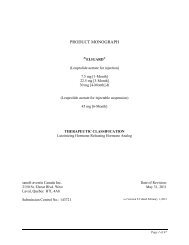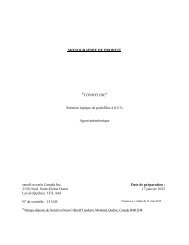Apidra (insulin glulisine) - Sanofi Canada
Apidra (insulin glulisine) - Sanofi Canada
Apidra (insulin glulisine) - Sanofi Canada
You also want an ePaper? Increase the reach of your titles
YUMPU automatically turns print PDFs into web optimized ePapers that Google loves.
SIDE EFFECTS AND WHAT TO DO ABOUT<br />
THEM<br />
COMMON PROBLEMS OF DIABETES<br />
Hypoglycemia (Insulin Reaction)<br />
Hypoglycemia (too little glucose in the blood) is one<br />
of the most frequent adverse events experienced by<br />
<strong>insulin</strong> users. It can be brought on by situations such<br />
as:<br />
• intercurrent conditions (illness, stress, or<br />
emotional disturbances),<br />
• accidental injection of an increased <strong>insulin</strong><br />
dose,<br />
• malfunction and/or misuse of medical<br />
devices,<br />
• too-low food intake, or skipped meals,<br />
• an increase in exercise,<br />
• a new <strong>insulin</strong> type or schedule,<br />
• some new medications, including<br />
prescriptions, over-the counter medications,<br />
herbs, vitamins and street drugs.<br />
Symptoms of mild to moderate hypoglycemia may<br />
occur suddenly and can include:<br />
• abnormal behavior (anxiety, irritability,<br />
restlessness, trouble concentrating,<br />
personality changes, mood changes,<br />
confusion or nervousness),<br />
• fatigue,<br />
• tingling in your hands, feet, lips, or tongue,<br />
• tremor (shaking),<br />
• unsteady gait (walking),<br />
• dizziness, light-headedness, or drowsiness,<br />
• headache,<br />
• blurred vision,<br />
• slurred speech,<br />
• palpitations (rapid heartbeat),<br />
• cold sweat,<br />
• pale skin,<br />
• nightmares or trouble sleeping,<br />
• nausea,<br />
• hunger.<br />
Mild to moderate hypoglycemia can be treated by<br />
consuming foods or drinks that contain sugar.<br />
Patients should always carry a quick source of sugar,<br />
such as candy, juice or glucose tablets, prominently<br />
IMPORTANT: PLEASE READ<br />
labelled for rescuers. Contact your health<br />
professional about appropriate proportions of<br />
carbohydrates.<br />
Signs of severe hypoglycemia can include:<br />
• disorientation,<br />
• convulsions,<br />
• loss of consciousness,<br />
• seizures.<br />
Severe hypoglycemia may require the assistance of<br />
another person. Patients who are unable to take sugar<br />
orally or who are unconscious may require an<br />
injection of glucagon or should be treated with<br />
intravenous administration of glucose by medical<br />
personnel. Without immediate medical help, serious<br />
reactions or even death could occur.<br />
The early warning symptoms of hypoglycemia<br />
may be changed, be less pronounced, or be absent,<br />
as for example, in patients whose sugar levels are<br />
markedly improved, in elderly patients, in patients<br />
with diabetic nerve disease, in patients with a long<br />
history of diabetes, or in patients receiving<br />
concurrent treatment with certain other drugs. Such<br />
situations may result in severe hypoglycemia (and<br />
possibly, loss of consciousness) before a patient has<br />
symptoms.<br />
Some people may not recognize when their blood<br />
sugar drops low. Without recognition of early<br />
warning symptoms, you may not be able to take steps<br />
to avoid more serious hypoglycemia. Be alert for all<br />
of the various types of symptoms that may indicate<br />
hypoglycemia. Patients who experience<br />
hypoglycemia without early warning symptoms<br />
should monitor their blood glucose frequently,<br />
especially prior to activities such as driving a car or<br />
use mechanical equipment. If the blood glucose is<br />
below your normal fasting glucose, you should<br />
consider eating or drinking sugar-containing foods to<br />
treat your hypoglycemia.<br />
If you have frequent episodes of hypoglycemia or<br />
experience difficulty in recognizing the symptoms,<br />
you should consult your health professional to<br />
discuss possible changes in therapy, meal plans,<br />
and/or exercise programs to help you avoid<br />
hypoglycemia.<br />
Page 44 of 61

















